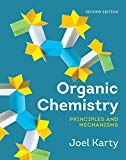
(a)
Interpretation:
The mechanism for the given reaction is to be drawn.

Concept introduction:
The substrates having the leaving group in a vinylic position are quire resistant to nucleophilic substitution and elimination reactions. The four electrons of the
(b)
Interpretation:
The mechanism for the given reactions is to be drawn.

Concept introduction:
The substrates having the leaving group in a vinylic position are quire resistant to nucleophilic substitution and elimination reactions. The four electrons of the
Want to see the full answer?
Check out a sample textbook solution
Chapter 10 Solutions
Organic Chemistry: Principles and Mechanisms (Second Edition)
- Draw the complete, detailed mechanism (curved arrows) for the following reaction. Br 2. H₂O OKarrow_forwardDraw the mechanism for the following reaction. 2-methyl-1-butene ---------Br2/H2O-------->arrow_forwardwhat is the mechanism for this reaction. Please answer fast I give you upvotearrow_forward
- How might nucleophilic catalysis work?Draw out a possible mechanism.arrow_forwardThe following reaction is believed to proceed through the intermediate shown. Draw the complete, detailed mechanism that leads to the formation of that intermediate. NH, NH3 HO НО НО OH `NH2arrow_forwardmechanism's for this reaction C. Ph CH3 CH3 steps OH H3C 'N' Ph Harrow_forward
 Organic Chemistry: A Guided InquiryChemistryISBN:9780618974122Author:Andrei StraumanisPublisher:Cengage Learning
Organic Chemistry: A Guided InquiryChemistryISBN:9780618974122Author:Andrei StraumanisPublisher:Cengage Learning
